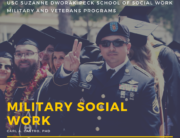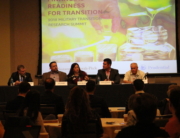A lack of preparation and unaddressed health issues have created some of the biggest challenges facing veterans searching for civilian employment, according to a new USC report.
Exploring the Economic and Employment Challenges Facing U.S. Veterans by the USC Center for Innovation and Research on Veterans & Military Families outlines the findings of a qualitative study of Volunteers of America’s (VOA) programs aimed at helping veterans find and keep jobs. The report is based on a review of the academic and think tank literature on the subject, along with interviews with VOA service providers and veteran clients.
Service providers and veterans both identified a lack of preparation regarding the transition process that created multiple challenges, including unrealistic expectations among many veterans about the jobs they qualified for, the level at which they would enter the civilian workforce, how easily they would find employment, or how much they should be compensated.
One post-9/11 veteran quoted in the report described the frustration of having to “start over:” “I was going to be a general manager of a [fast food restaurant] and the idea of that just [expletive] made me want to hang myself, you know. After Afghanistan and all of that, I just couldn’t do it.”
Unaddressed mental health issues, like post-traumatic stress disorder and depression, were also identified as risk factors for unemployment among veterans. Service providers also identified substance abuse as an inter-connected issue for many veterans who are self-medicating to treat these mental health issues.
The study also found that certain populations of veterans have a more difficult time finding employment, such as older veterans, those with less-than-honorable discharges, and those with criminal backgrounds.
As part of its efforts to improve service to veterans, the report was commissioned by VOA to highlight the main challenges to employment, along with best practices and recommendations for further growth.
The report noted VOA’s strengths, including a holistic, multi-agency approach to addressing veteran needs. VOA also does a good job of connecting veterans to services, information and, most importantly, other veterans whose shared experience is a valuable asset.
Among the recommendations, the report highlighted the need for a “civilian basic training” to help veterans transition to post-military life and workplaces. Acknowledging the unique challenges faced by different populations of veterans, the report also suggested creating programs to specifically target all veterans, including harder-to-place populations (e.g., older veterans, less-than-honorable discharges, criminal backgrounds).
Commissioned by the VOA, Exploring the Economic and Employment Challenges Facing U.S. Veterans: A Qualitative Study of Volunteers of America Service Providers and Veteran Clients was authored by Sara Kintzle, Mary Keeling, Elizabeth Xintarianos, Kamil Taylor-Diggs, Chris Munch, Anthony M. Hassan, and Carl A. Castro.
Download executive summaryDownload full report








